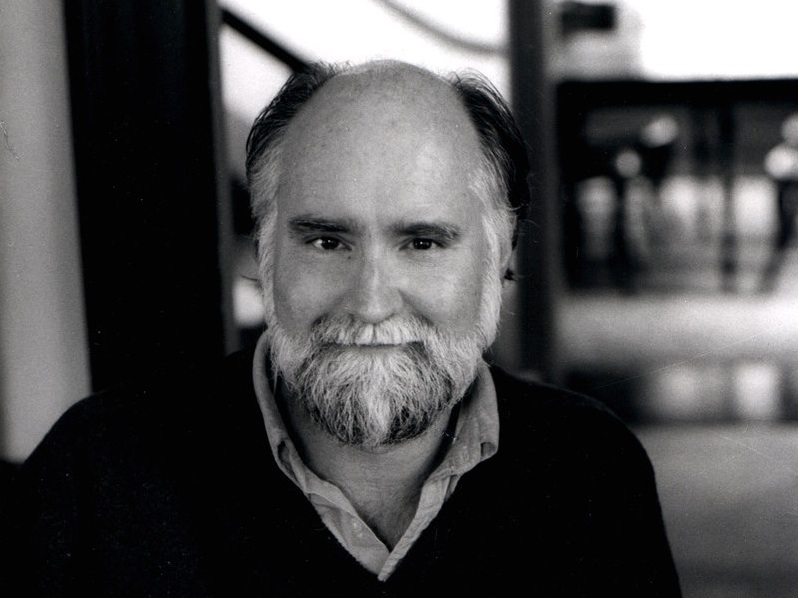Nicholson Baker Navigates the Buffet

ABOVE: NICHOLSON BAKER. IMAGE COURTESY OF JERRY BAUER
Nicholson Baker is a recluse of sorts. Not in the vein of J. D. Salinger—not as extreme—but as he’s quick to share, his life in Maine is that of “a happily married guy in a certain amount of isolation from literary ferment.” But where Salinger created Holden Caulfield, his iconic teenage alter ego, for The Catcher in the Rye, Baker uses direct experience to shape Paul Chowder, a witty and insightful middle-aged poet, in Traveling Sprinkler, his sequel to The Anthologist.
Blurring the line between fiction and nonfiction is familiar territory for Baker. From his first novel, The Mezzanine, tracking the thought process of a man on lunch break, to the present, he’s written more than a dozen books on topics ranging from phone sex (Vox) to John Updike (U and I) to the way the world works (The Way the World Works: Essays).
We tracked Baker down over email and then over the phone for a fascinating conversation about the importance of truth-telling in the novel, the difficulties of navigating buffets, and Orange is the New Black.
JARED LEVY: With this book, there’s an interviewing of yourself that’s taking place. Is that right to say?
NICHOLSON BAKER: Yes, Traveling Sprinkler is part two of my attempt to use that method. In The Anthologist, I recorded myself trying to explain things into my video camera, and I filmed myself in various places around the house—outside and inside. I transcribed what I said and cleaned it up, and a lot of what I said in those self-interviews came out in the book. Obviously, I had to make adjustments—but it was hugely helpful. It forces you to say what’s true in a different order than you’d say it if you were sitting at a keyboard trying to do your best. You’re more honest and more innocent at the same time. You’re naked.
There’s something paralyzing about being a writer that you have to escape. I don’t want to think of myself as a guy who’s written a bunch of books. The 26 letters distance us from our own hesitations and they make us sound as if we know what we’re doing. We know grammar, we know prose, but actually we’re all just struggling in the dark, really.
LEVY: I wonder, though: Why, then, is Traveling Sprinkler a novel?
BAKER: That’s an interesting question. It has to do with truth-telling. When you’re writing, let’s say, an essay for a magazine, you try to tell the truth at every moment. You do your best to quote people accurately and get everything right. Writing a novel is a break from that: freedom. When you’re writing a novel, you are in charge; you can beef things up.
Sometimes your character has a reversal; something happens. Let’s say his barn floor collapses and it squashes a canoe. That’s based on something that happened to me. My barn floor collapsed. But it didn’t happen quite that way. What happened was—I’m married, so my wife calls up and says, “The barn floor collapsed.” But in the novel, I can change things and simplify, and make events work towards whatever meanings I’m trying to get at more efficiently.
But as soon as you start doing that—changing things—it seems self-evident to me that you’ve entered the world of make-believe. If you pretend that it’s true, and use your own name, you are misleading people. Fiction is looser and wilder and sometimes in the end more self-revealing, anyway.
LEVY: Is it important to you, writing something as fiction, to inform your reader, or at least gesture toward the reader, when something is true?
BAKER: I hope that when the main character, Paul Chowder, the poet, a muddled guy, addresses the reader, saying, “There’s this great YouTube video in which somebody is in his dorm room and sings a protest song,” I want that YouTube video to actually be there. I want my fiction to teach people a few odd, possibly interesting things along the way. That Archibald MacLeish was a poet—and that he was the grandfather of the Central Intelligence Agency. Those are true things that I think my character would be able to consider at that moment. I’m being a ventriloquist and rooting observations and enthusiasms in a mind that is slightly different from my own. But not that different! Not that different.
LEVY: It’s as if you’re engaging your reader on two levels: brain receptors that are entertained and engaged with the story, but there’s also all the information. It’s like a fascinating friend who puts up great stuff on Facebook that makes your day a little more interesting.
BAKER: It’s nice of you to respond that way, because it is what I was trying to do. We have all sorts of people telling us we’ve got to see Orange is the New Black, or that it’s terribly important to read a certain magazine article. Meanwhile, there are all the things you want to do. You might want to bicycle really fast down a hill. All of these possibilities are competing in your mind. You want to be interesting to other people, but also you want sometimes to listen to a certain song for the thousandth time, or sit quietly and do nothing. It’s nuts, really. Our lives are just public. There are all these different competing urges and emotions and sometimes indignations, political feelings. You might read about some terrible thing that’s happened, but then you have to go eat a sandwich. That’s always interested me. Our daily lives have a kaleidoscopic quality, a feeling of walking down a breakfast buffet and spooning out things onto your plate. And there’s a lot to eat at this brunch of experience. Too many pineapple rings, too many sausages, too much syrup. The job of the novel is to be true to the confusion, but not so confusing that you turn the reader off.
LEVY: As somebody who was bullied into watching Orange is the New Black and has a terrible time navigating buffets, I appreciate that service.
BAKER: What did you think of Orange is the New Black?
LEVY: It’s an exciting premise, but I feel like there isn’t a great command over what are the interesting elements of the story and what’s filler. Did you watch it?
BAKER: Oh yeah. We binge-watched it, not all in one weekend, my wife and I, but close. Some TV shows are like really good novels in that there are enough episodes that you start to have your own feelings about how the characters should act. When the scriptwriters go slightly wrong, when they make the character make a left turn that he or she wouldn’t do, you know enough about the characters to say, “No, that’s not what she would do there. That’s wrong.” You can actually argue with a TV show in a way that you can’t do as much with movie—you inhabit a TV show in the way you inhabit a novel. You feel you know the characters better than the showrunner might know them, on occasion. There are some really great, witty, funny moments in Orange is the New Black. Some of the scriptwriters I thought were totally brilliant and hilarious. At other times I thought, “Why are you inventing this contrived situation?” A problem that I have with everything fictional is that writers are always having to come up with sudden artillery explosions in the middle of whatever is going on. The characters are having interesting, subtle interactions, or jealousies, or whatever it is, and suddenly some gigantic angry eruption has to happen, a giant gasp where everyone has to scramble around. That’s the point where I’m turned off. I want the dynamic range to be a little smaller. I don’t like the big false bangs.
LEVY: What are some other shows you watch?
BAKER: There’s a British show called Call the Midwife. Terrific, if you like watching laundry hanging to dry on clotheslines and babies being born. I liked House of Cards and I liked Downton Abbey, to be totally truthful. I’m a sucker for interiors and carefully, beautifully filmed people sitting in a big room. My appetites are simple.
NICHOLSON BAKER’S TRAVELING SPRINKLER IS OUT TOMORROW.






